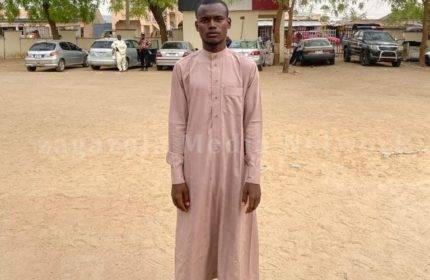Mahmud Mamman Nur Albarnawy, the eldest son of Mamman Nur, the founder of the Islamic State of the West African Province (ISWAP), has surrendered to the Nigerian Security and Civil Defence Corps in Maiduguri. The 22-year-old Mahmud surrendered on Sunday, May 12, after a carefully orchestrated operation facilitated by his uncle in Gamborun Ngala.
Intelligence sources have confirmed that Mahmud underwent profiling at the Command Headquarters of NSCDC in Maiduguri, where he was identified as the senior son of the late ISWAP founder. The surrender was facilitated by the command after receiving information that Mahmud was willing to formally surrender to the Nigerian government. A reliable agent was dispatched to convey him safely to Maiduguri, where they arrived on May 11.
Confessions and Revelations
During the debriefing and profiling process conducted by an intelligence officer of the command, Mahmud confessed to having sneaked out of the Ali Ngulde camp in Mandara Mountain, Gwoza LGA, and stayed in Maiduguri for about a month before relocating to Gamboru Ngala. His presence in these areas did not raise any alarms or distress signs from the local communities.
Mahmud revealed that during his stay in Gamboru Ngala, some of his late father’s loyalists attempted to persuade him to return to the Lake Chad general area and pledge allegiance to ISWAP. However, he refused, citing the betrayal and eventual execution of his late father by the group.
Militant History and Rehabilitation
In a startling confession, Mahmud admitted to having taken part in attacks in Bama, Banki, Gwoza, and several other places as a middle-rank fighter under the Boko Haram group. His involvement in the militant activities of the group underscores the significance of his surrender and the potential intelligence he may provide to the Nigerian authorities.
After the debriefing process, Mahmud was handed over to the Bulunkutu rehabilitation facility for further documentation and custody. The authorities hope that his rehabilitation and reintegration into society will serve as a catalyst for others to abandon the path of violence and embrace peace.
Who Is Mamman Nur? ISWAP Founder’s son
In 2013, amidst escalating pressure from Joint Security Forces in Maiduguri, Mamman Nur, along with other top commanders of Boko Haram, including Abubakar Shekau, relocated from Maiduguri to Sambisa forest. This strategic move marked a pivotal moment in the group’s evolution, as they intensified their violent campaign through coordinated attacks on communities, solidifying their status as a terror organization.
Alliance and Betrayal
In March 2015, Boko Haram pledged allegiance to the ISIS Caliphate, signaling a shift in their tactics and objectives. However, internal strife soon emerged within the ranks, leading to the removal of Abubakar Shekau as the leader of the Islamic State of the West African Province (ISWAP). Mamman Nur and Abu Mussab Albarawi, members of the Shura Consultative Council, spearheaded the petition against Shekau, citing ideological extremism, unjust practices, and atrocities against civilians.
This internal power struggle culminated in the separation of Boko Haram and ISWAP, with Mamman Nur assuming the role of the New Spiritual Leader in the Lake Chad region. However, his reign was short-lived, as internal dissent within ISWAP resulted in his demise in a mutiny orchestrated by Abou Mossab Albarnawyy and ISWAP fighters. Nur’s decision to release abducted schoolgirls without demanding ransom from the Nigerian government sealed his fate, leading to his elimination and the ascension of Albarnawyy as the new spiritual leader of ISWAP.
Mamman Nur’s journey from a prominent Boko Haram commander to a contested leader within ISWAP underscores the complex dynamics of insurgency movements in the region. His actions and the subsequent power struggles shed light on the volatile nature of terrorist organizations and the ever-shifting alliances that define their operations.
Table of Contents
Discover more from OGM News NG
Subscribe to get the latest posts sent to your email.














